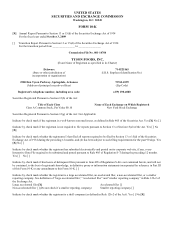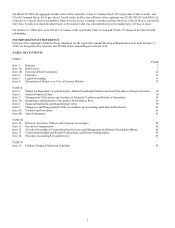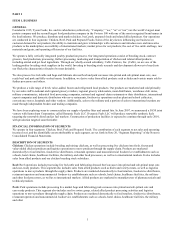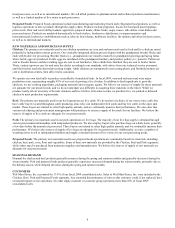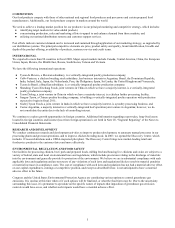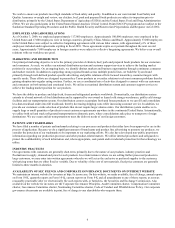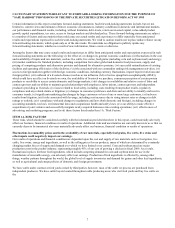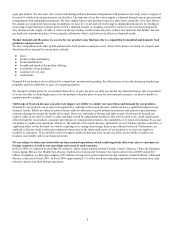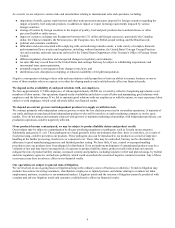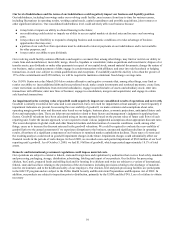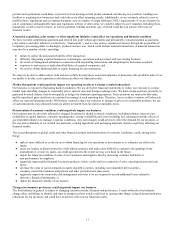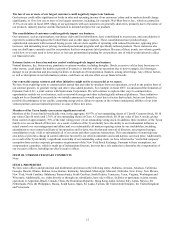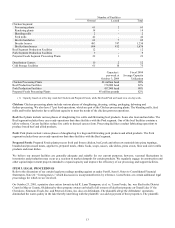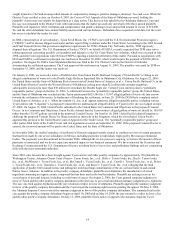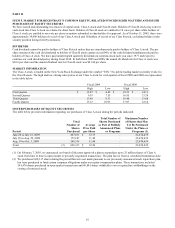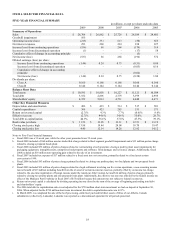Tyson Foods 2009 Annual Report Download - page 9
Download and view the complete annual report
Please find page 9 of the 2009 Tyson Foods annual report below. You can navigate through the pages in the report by either clicking on the pages listed below, or by using the keyword search tool below to find specific information within the annual report.9
As a result, we are subject to various risks and uncertainties relating to international sales and operations, including:
●
imposition of tariffs, quotas, trade barriers and other trade protection measures imposed by foreign countries regarding the
import of poultry, beef and pork products, in addition to import or export licensing requirements imposed by various
foreign countries;
●
closing of borders by foreign countries to the import of poultry, beef and pork products due to animal disease or other
perceived health or safety issues;
●
impact of currency exchange rate fluctuations between the U.S. dollar and foreign currencies, particularly the Canadian
dollar, the Chinese renminbi, the Mexican peso, the European euro, the British pound sterling, and the Brazilian real;
●
political and economic conditions;
●
difficulties and costs associated with complying with, and enforcing remedies under, a wide variety of complex domestic
and international laws, treaties and regulations, including, without limitation, the United States' Foreign Corrupt Practices
Act and economic and trade sanctions enforced by the United States Department of the Treasury's Office of Foreign Assets
Control;
●
different regulatory structures and unexpected changes in regulatory environments;
●
tax rates that may exceed those in the United States and earnings that may be subject to withholding requirements and
incremental taxes upon repatriation;
●
potentially negative consequences from changes in tax laws; and
●
distribution costs, disruptions in shipping or reduced availability of freight transportation.
Negative consequences relating to these risks and uncertainties could jeopardize or limit our ability to transact business in one or
more of those markets where we operate or in other developing markets and could adversely affect our financial results.
We depend on the availability of, and good relations with, our employees.
We have approximately 117,000 employees, of whom approximately 40,000 are covered by collective bargaining agreements or are
members of labor unions. Our operations depend on the availability and relative costs of labor and maintaining good relations with
employees and the labor unions. If we fail to maintain good relations with our employees or with the unions, we may experience labor
strikes or work stoppages, which could adversely affect our financial results.
We depend on contract growers and independent producers to supply us with livestock.
We contract primarily with independent contract growers to raise the live chickens processed in our poultry operations. A majority of
our cattle and hogs are purchased from independent producers who sell livestock to us under marketing contracts or on the open
market. If we do not attract and maintain contracts with growers or maintain marketing relationships with independent producers, our
production operations could be negatively affected.
If our products become contaminated, we may be subject to product liability claims and product recalls.
Our products may be subject to contamination by disease-producing organisms or pathogens, such as Listeria monocytogenes,
Salmonella and generic E. coli. These pathogens are found generally in the environment; therefore, there is a risk they, as a result of
food processing, could be present in our products. These pathogens also can be introduced to our products as a result of improper
handling at the further processing, foodservice or consumer level. These risks may be controlled, but may not be eliminated, by
adherence to good manufacturing practices and finished product testing. We have little, if any, control over proper handling
procedures once our products have been shipped for distribution. Even an inadvertent shipment of contaminated products may be a
violation of law and may lead to increased risk of exposure to product liability claims, product recalls (which may not entirely
mitigate the risk of product liability claims), increased scrutiny and penalties, including injunctive relief and plant closings, by federal
and state regulatory agencies, and adverse publicity, which could exacerbate the associated negative consumer reaction. Any of these
occurrences may have an adverse effect on our financial results.
Our operations are subject to general risks of litigation.
We are involved on an on-going basis in litigation arising in the ordinary course of business or otherwise. Trends in litigation may
include class actions involving consumers, shareholders, employees or injured persons, and claims relating to commercial, labor,
employment, antitrust, securities or environmental matters. Litigation trends and the outcome of litigation cannot be predicted with
certainty and adverse litigation trends and outcomes could adversely affect our financial results.

